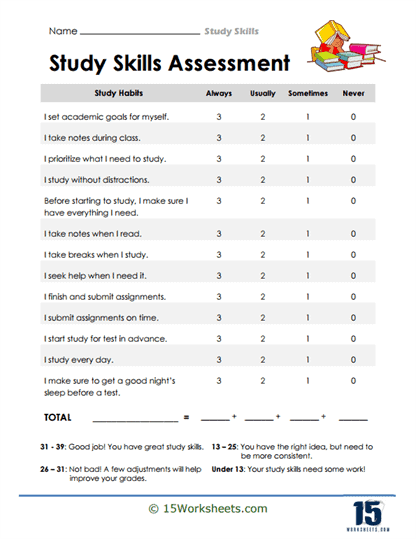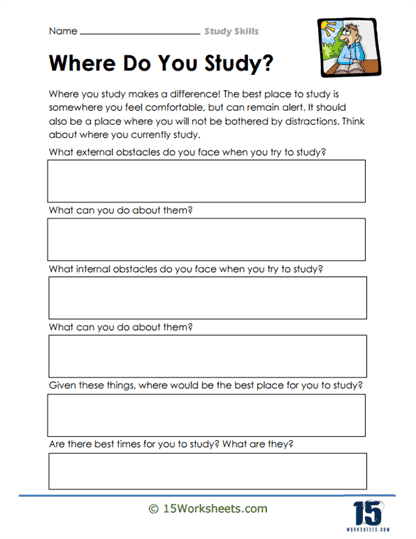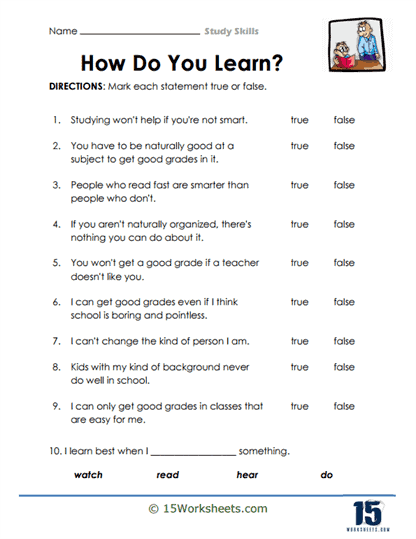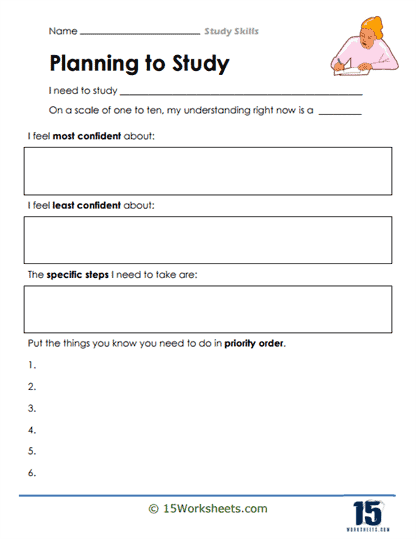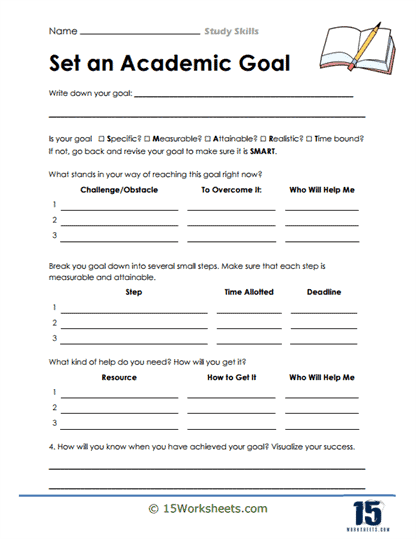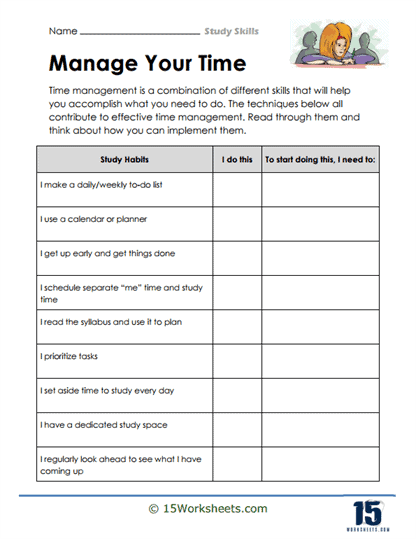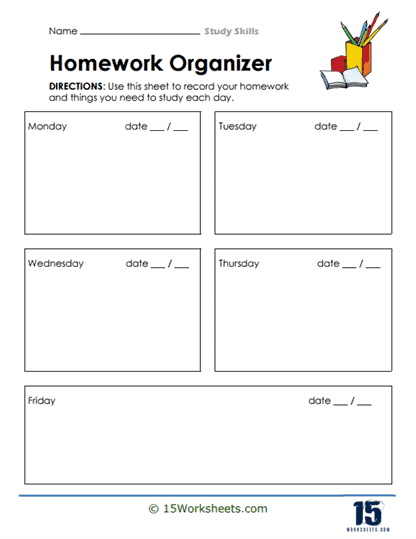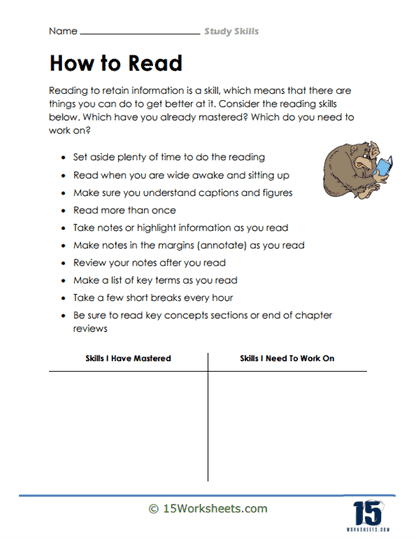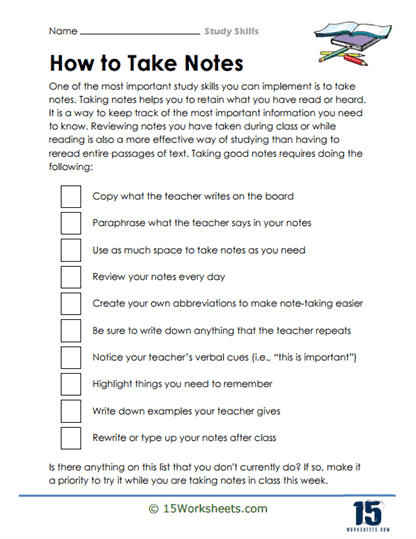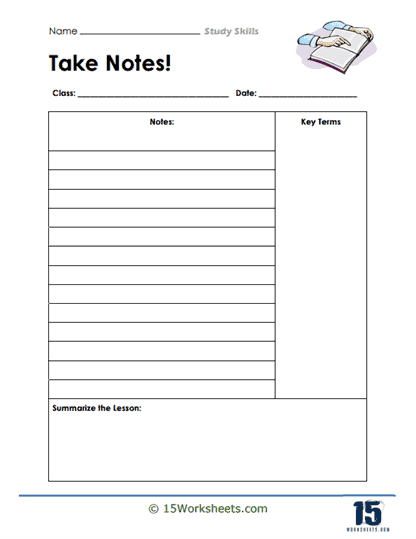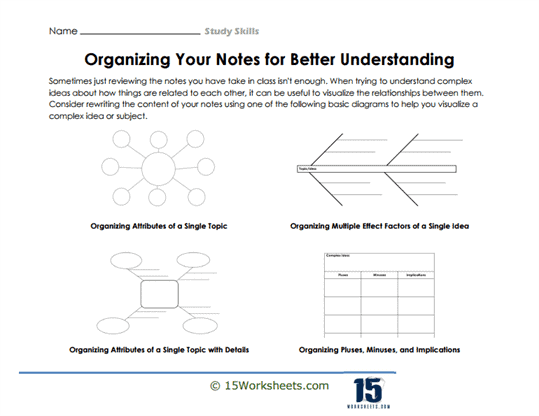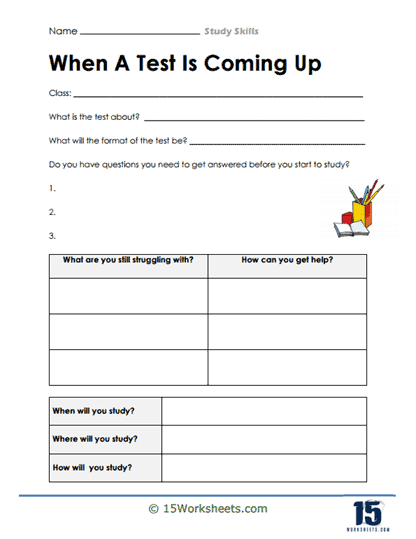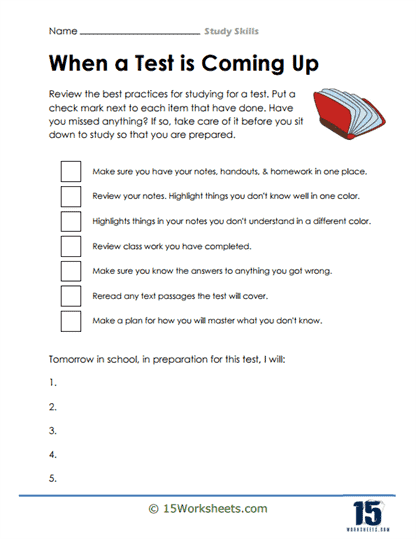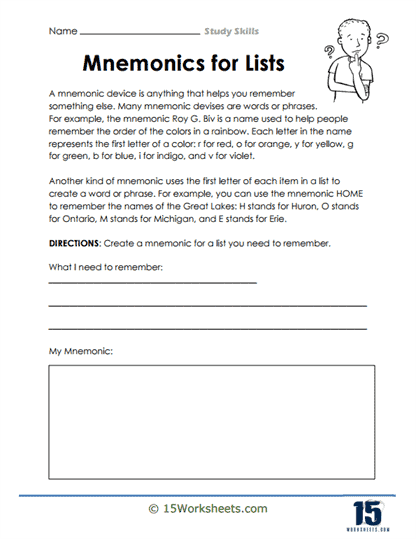Study Skills Worksheets
All About These 15 Worksheets
This series of 15 worksheets on Study Skills is designed to equip students with effective strategies and techniques for successful studying. These worksheets cover a wide range of topics related to study skills, including self-assessment, study environment, learning styles, goal-setting, time management, note-taking, reading skills, test preparation, and mnemonic techniques. By engaging with these worksheets, students can develop essential study skills, improve their learning outcomes, and cultivate habits that promote academic success. Through these worksheets, students will:
- Assess their current study habits and skills to reflect on their strengths and areas for improvement;
- Recognize the significance of an ideal study space that supports focus and concentration;
- Learn to set specific study goals, break tasks into manageable chunks, and create a study schedule that maximizes productivity and minimizes procrastination;
- Define their goals, identify actionable steps, and track their progress to stay motivated and focused;
- Prioritize tasks, create schedules, and use time wisely to balance their academic responsibilities with other commitments;
- Develop strategies for completing assignments efficiently;
- Learn effective note-taking strategies and apply them;
- And create their own mnemonic devices to aid in memorization.
This series of worksheets on Study Skills offers students a comprehensive toolkit to enhance their study habits, improve their learning outcomes, and excel academically. By engaging with these worksheets, they can assess their study skills, identify areas for improvement, and develop effective strategies for organizing, managing, and retaining information.
Effective study skills are essential for academic success, and these worksheets provide students with practical resources to cultivate habits that promote efficient and effective studying. With enhanced study skills, students can become more confident, independent learners and achieve their academic goals.
What Are Learning Styles?
Learning styles are the preferred ways in which individuals process, comprehend, and retain information. Each person has a unique way of learning, which may involve one or more learning styles. Recognizing and understanding these styles can help learners optimize their study techniques and educators tailor their teaching methods to suit different students.
There are several models of learning styles, but one of the most widely recognized is the VARK model, which identifies four primary types of learners:
Visual Learners
Visual learners prefer to process information through images, diagrams, charts, graphs, and other visual aids. They typically have strong spatial awareness and can easily visualize concepts in their minds. Visual learners may benefit from using mind maps, color-coding, and other visual techniques when studying.
Auditory Learners
Auditory learners learn best through listening and verbal communication. They excel at retaining information from lectures, discussions, and audio recordings. These learners may benefit from reading aloud, participating in group discussions, and using mnemonic devices based on sound patterns.
Reading/Writing Learners
Reading/Writing learners prefer to learn through written text, such as books, articles, and notes. They often have strong reading comprehension and writing skills and may benefit from taking detailed notes, summarizing concepts in their own words, and reading a variety of texts on a subject.
Kinesthetic Learners
Kinesthetic learners learn best through hands-on experiences, physical activities, and direct interaction with their environment. They often have strong motor skills and excel at learning through practice and trial-and-error. Kinesthetic learners may benefit from participating in lab experiments, role-playing activities, and other experiential learning opportunities.
It’s important to note that most people use a combination of learning styles, and these preferences may change depending on the context or subject matter. Understanding your own learning style or those of your students can help create more effective learning experiences and improve overall academic success. However, it’s also essential to remain adaptable and explore different learning methods, as some subjects or tasks may require a more diverse approach.
How To Improve Your Study Technique
Improving how you study can lead to better retention of information, increased understanding, and more efficient use of your time. Here are some tips to help you enhance your study habits:
Set Clear Goals
Define specific, achievable goals for each study session, such as mastering a particular concept or completing a certain number of practice problems. This will help you stay focused and motivated.
Develop a Study Schedule
Create a consistent study routine by allocating specific times each day or week for studying. Stick to your schedule as much as possible to build good study habits and maintain momentum.
Find a Conducive Study Environment
Choose a quiet, comfortable space with minimal distractions to help you focus. Ensure you have adequate lighting, a comfortable chair, and all the necessary materials within reach.
Break Tasks into Smaller Chunks
Divide larger tasks or topics into smaller, manageable sections. This makes the material less overwhelming and allows you to focus on one aspect at a time.
Use Active Learning Techniques
Engage with the material actively by taking notes, summarizing concepts in your own words, asking questions, or teaching the material to someone else. Active learning promotes deeper understanding and better retention.
Apply Different Learning Styles
Experiment with various learning styles, such as visual, auditory, and kinesthetic, to determine which methods work best for you. Use a combination of techniques, like reading, listening to lectures, watching videos, or working with hands-on activities, to reinforce your understanding.
Utilize Mnemonic Devices
Employ mnemonic strategies, such as acronyms, associations, or visualizations, to help you remember key concepts or facts more easily.
Practice Regularly
Consistent practice and review are crucial for long-term retention. Schedule regular review sessions to reinforce your learning and identify areas that need further study.
Test Yourself
Use self-assessment techniques, like quizzes, flashcards, or practice exams, to evaluate your understanding and identify areas that need improvement. Testing yourself helps strengthen memory recall and reinforces learning.
Take Breaks and Manage Stress
Avoid cramming and lengthy study sessions, which can lead to burnout and reduced retention. Schedule regular breaks and engage in stress-relief activities, such as exercise, meditation, or hobbies, to maintain a healthy balance.
Seek Help (when needed)
If you’re struggling with a concept or topic, don’t hesitate to ask for help from teachers, tutors, classmates, or online resources. Getting assistance can help you overcome obstacles and deepen your understanding.
By implementing these strategies and continuously refining your study habits, you can improve your overall learning experience and achieve better results in your academic pursuits.

